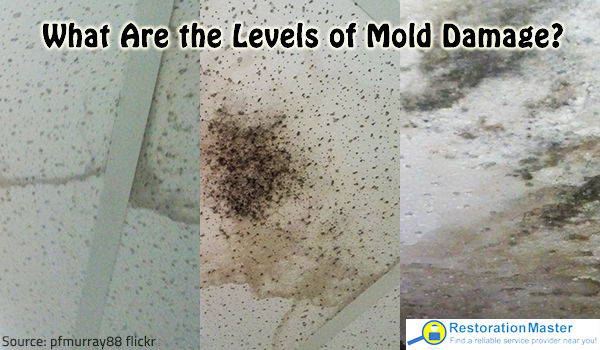How Dehumidifiers Help Lower Moisture in your Home
Whether you live in a muggy climate or in a cold climate, you may still experience high indoor humidityHumidity is the amount of moisture or water vapor present in... More levels. Warm air contains large amounts of water vaporVapor is the gaseous form of a substance that is typically l... More, so excessive moisture is a common problem in areas with high temperatures and abundant rainfall, as well as in areas located near large bodies of water. Cold air, on the other hand, is quite dry but homes in colder climates also have moisture problems – they are well insulated for energy efficiency which results in decreased air circulation and excessive humidityHumidity is the amount of moisture or water vapor present in... More. Besides, multiple indoor sources add to the moisture of the air you breathe in your home – steam from cooking and bathing, water vaporVapor is the gaseous form of a substance that is typically l... More from wet clothes left to dry inside, evaporationEvaporation is the process by which a liquid, such as water,... More from indoor plants, etc. If the resulting relative humidityRelative humidity (RH) is the percentage of moisture in the ... More level exceeds 50%, however, you may experience a variety of problems, from musty smells and moldMold is a type of fungus that grows in damp or humid conditi... More growth to structural damage and exacerbated health issues. To keep your living environment healthy and comfortable, you need to find an efficient way to reduce the moisture in your home and improve indoor air qualityIndoor air quality (IAQ) refers to the condition of the air ... More. Without a doubt, your best bet is to use a dehumidifierA dehumidifier is a device that removes excess moisture from... More.
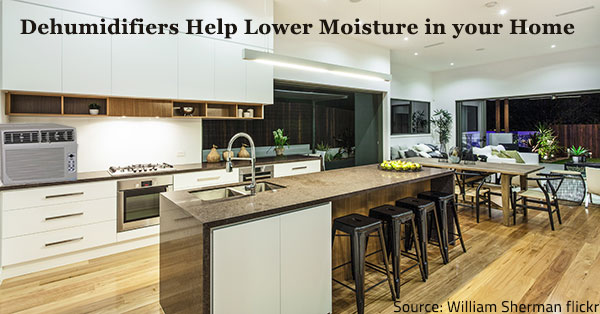
Dehumidifiers allow you to keep the air humidityHumidity is the amount of moisture or water vapor present in... More in your home at an optimal level.
What Is a Dehumidifier?
A dehumidifierA dehumidifier is a device that removes excess moisture from... More is a simple electronic device used to control air humidityHumidity is the amount of moisture or water vapor present in... More in closed premises with limited air circulation.
But how does a dehumidifierA dehumidifier is a device that removes excess moisture from... More work? A powerful fan draws in humid air from the atmosphere and carries it through a refrigerated evaporator. The air is cooled below its dew point, so condensation occurs and water drops form on the cold surface of the evaporator (they drip into a water container you need to empty on a regular basis). The cold dry air is then reheated to a pre-set temperature and released back into the room. The process continues so that indoor air humidityHumidity is the amount of moisture or water vapor present in... More is maintained at the desired level.
Eliminating dampness, however, is not the only benefit of using a home dehumidifierA dehumidifier is a device that removes excess moisture from... More – this small cost-effective device can help you improve your indoor environment in a number of crucial aspects.
Benefits of a Dehumidifier
Dehumidifiers allow you to control the air humidityHumidity is the amount of moisture or water vapor present in... More in your home and keep it at an optimal level. This will be beneficial in many ways:
Improved Health
Various allergens, microorganisms, and virusesViruses are microscopic infectious agents that can only repr... More thrive in humid environment. When dehumidifiers decrease the moisture in your home, they help improve indoor air quality and prevent bacteria growth.
- Fewer allergens – dust mites, moldMold is a type of fungus that grows in damp or humid conditi... More sporesSpores are microscopic reproductive units of fungi or mold t... More, and other allergy triggers need a certain humidityHumidity is the amount of moisture or water vapor present in... More level in order to breed. So, reduced humidityHumidity is the amount of moisture or water vapor present in... More results in fewer allergens in your home. Besides, dehumidifiers have inbuilt filters that capture dust, pollen, moldMold is a type of fungus that grows in damp or humid conditi... More sporesSpores are microscopic reproductive units of fungi or mold t... More, and other air pollutants. As a result, the air in your home becomes much cleaner and healthier to breathe;
- Fewer respiratory problems –indoor air contaminants that develop in humid environment (such as virusesViruses are microscopic infectious agents that can only repr... More, moldMold is a type of fungus that grows in damp or humid conditi... More sporesSpores are microscopic reproductive units of fungi or mold t... More, etc.) may trigger or aggravate respiratory problems. What’s more, high air humidityHumidity is the amount of moisture or water vapor present in... More can inhibit breathing, especially in sick people, senior people, and children. A dehumidifierA dehumidifier is a device that removes excess moisture from... More will make breathing much easier and will reduce the risk of asthma attacks, infections, respiratory illnesses, and allergy symptoms, such as stuffy nose, itchy eyes, wheezing, skin rashes, general discomfort, etc.
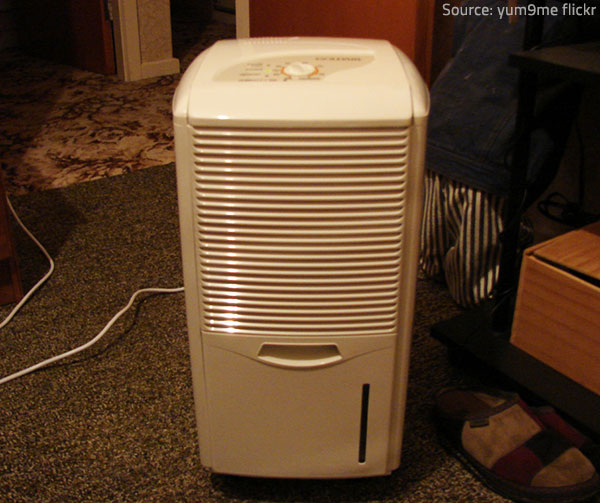
Dehumidifiers not only eliminate dampness, but also help improve your health and the overall condition of your home.
Excellent Property Condition
Proper indoor humidityHumidity is the amount of moisture or water vapor present in... More has a positive effect on the overall condition of your property – dehumidifiers help prevent damage to your household items and materials, get rid of moldMold is a type of fungus that grows in damp or humid conditi... More and musty odors, etc.
- No moldMold is a type of fungus that grows in damp or humid conditi... More – more often than not, high humidityHumidity is the amount of moisture or water vapor present in... More results in moldMold is a type of fungus that grows in damp or humid conditi... More MoldMold is a type of fungus that grows in damp or humid conditi... More commonly resides on shower walls, windowsills, and other moist areas in the home. Unless timely removed, it can cause considerable structural damage and various health issues. The only way to get rid of moldMold is a type of fungus that grows in damp or humid conditi... More for good is to maintain low humidityHumidity is the amount of moisture or water vapor present in... More levels in your home, best achieved with the help of a dehumidifierA dehumidifier is a device that removes excess moisture from... More;
- No musty smells – a damp smell in your home indicates high moisture contentMoisture content is the amount of water present in a materia... More in the air. It may disappear when you ventilate the premises well and allow plenty of sunlight inside. Musty odorAn odor is a smell, often detectable by the human nose, whic... More, however, is often the first sign of moldMold is a type of fungus that grows in damp or humid conditi... More growing in your home, so you can’t remove the smell unless you remove the moldMold is a type of fungus that grows in damp or humid conditi... More sporesSpores are microscopic reproductive units of fungi or mold t... More that produce it first. Once you have gotten rid of the harmful microorganisms, use a dehumidifierA dehumidifier is a device that removes excess moisture from... More in the room to prevent moldMold is a type of fungus that grows in damp or humid conditi... More growth and musty smell in the future;
- No condensation – high humidityHumidity is the amount of moisture or water vapor present in... More results in heavy condensation that can harm the structural elements in your home – paint may blister, wallpaper may peel, stains may appear on the walls or on the ceiling, etc.
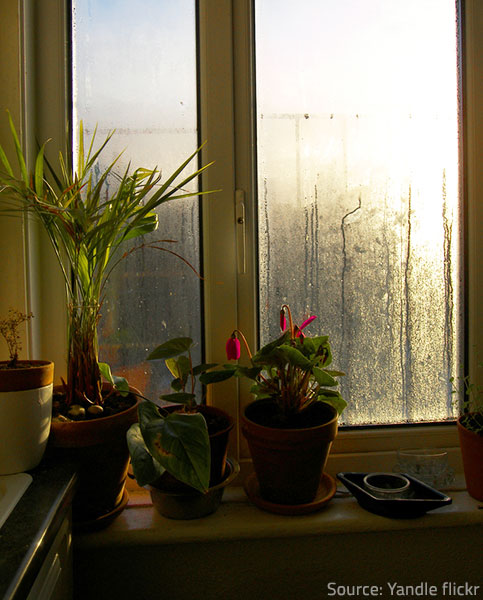
The outside world seem beautiful and mysterious through the small water drops on your windows, but condensation is harmful for your household items and materials.
Running a home dehumidifierA dehumidifier is a device that removes excess moisture from... More while cooking, when doing laundry or washing the dishes, after a shower, etc. can help prevent condensation;
- No corrosion – metal surfaces, door hinges, small tools, and even electronic equipment may easily rustRust is a reddish-brown oxide that forms on iron or steel du... More if the atmosphere in your home is too damp. A room dehumidifierA dehumidifier is a device that removes excess moisture from... More will help prevent corrosion and protect your belongings;
- No warpingWarping is the bending, twisting, or distortion of materials... More – moisture can cause wood to warp, so high levels of humidityHumidity is the amount of moisture or water vapor present in... More in your home may result in warped wood floors, door frames, and other damaged woodwork. Once again, dehumidifiers provide an effective solutionA solution is a homogeneous mixture of two or more substance... More as they help forestall warpingWarping is the bending, twisting, or distortion of materials... More;
- No damaged belongings – when you have a dehumidifierA dehumidifier is a device that removes excess moisture from... More in your home, your personal items are less likely to get damaged. Your documents, books, clothes, shoes, pieces of art, and other delicate belongings will be well protected against the effects of moisture – they will stay in excellent condition for long, will not develop moldMold is a type of fungus that grows in damp or humid conditi... More, and will not absorb musty smells.
Pest Control
Basements, crawls spaces, bathrooms, laundry rooms, and other moist areas in your home are very welcoming for millipedes, spiders, cockroaches, silverfish, and other pests. These little critters may cause damage to your possessions and pose a threat to your health. Removing excessive moisture from indoor air can help get rid of these pests, as they won’t be able to breed and thrive in an environment that is not humid enough for their needs. A crawl space dehumidifierA dehumidifier is a device that removes excess moisture from... More will, therefore, discourage any nuisance creatures from taking shelter in your home.
Lower Energy Costs
It may be hard to believe but using a dehumidifierA dehumidifier is a device that removes excess moisture from... More actually lowers your energy costs. The reason is quite simple – your air conditioner works more efficiently when a dehumidifierA dehumidifier is a device that removes excess moisture from... More is running in the room. When the air in your home is more humid, it is more difficult to keep the ambient temperature at the desired level, so your air conditioner has to work harder. The dehumidifierA dehumidifier is a device that removes excess moisture from... More, however, removes the moisture from the air and helps the air conditioner easily maintain a comfortable temperature. This results in lots of saved energy, as well as in less wear and tear on your cooling equipment. Not only will you have lower energy bills when using a dehumidifierA dehumidifier is a device that removes excess moisture from... More in your home, but you won’t have to repairRepair is the act of fixing or restoring damaged property, m... More or replace your air conditioner for quite a long time.
Increased Indoor Comfort
A home dehumidifierA dehumidifier is a device that removes excess moisture from... More helps create a fresh and clean indoor environment, considerably increasing your comfort:

Proper indoor humidityHumidity is the amount of moisture or water vapor present in... More results in a fresh, healthy, and comfortable indoor environment.
- Indoor air qualityIndoor air quality (IAQ) refers to the condition of the air ... More will improve substantially;
- Stuffiness in your home will be greatly reduced;
- The ambient temperature will be pleasant all the time;
- Wet clothes will dry faster when placed on a dryingDrying is the process of removing moisture from materials, s... More rack near a running dehumidifierA dehumidifier is a device that removes excess moisture from... More. Regardless of the outside weather conditions, your clothes will be dried overnight, without increasing indoor humidityHumidity is the amount of moisture or water vapor present in... More. Besides, a dehumidifierA dehumidifier is a device that removes excess moisture from... More doesn’t use as much power as a conventional dryer, so your energy bill won’t soar up as a result;
- Groceries, especially bread and cereals, will stay fresh longer without getting stale;
- Cleaning will be easier as the amount of dust and mildewMildew is a type of fungus that grows on damp surfaces, typi... More in your home will be considerably reduced.
Dehumidifiers run quietly and efficiently in the background, providing the best possible solutionA solution is a homogeneous mixture of two or more substance... More for your humidityHumidity is the amount of moisture or water vapor present in... More problems without disrupting your daily routine.
When to Use a Dehumidifier
HumidityHumidity is the amount of moisture or water vapor present in... More levels in your home may vary due to changing outside temperatures, weather conditions, energy use, air circulation, etc. Yet, if you live in a humid environment, you are strongly recommended to keep a dehumidifierA dehumidifier is a device that removes excess moisture from... More running all the time. Otherwise, consider using a dehumidifierA dehumidifier is a device that removes excess moisture from... More if you notice evidence of high humidityHumidity is the amount of moisture or water vapor present in... More in certain rooms or areas of your home, or if you suffer from constant allergy symptoms. Watch out for the following signs:
- Inhibited breathing, respiratory problems, or asthma attacks;
- Water damage on structural materials, household goods, furnishing, personal items, etc;
- Water stains on the walls or ceilings of your rooms and/or frequent condensation;
- Musty smells and/or moldMold is a type of fungus that grows in damp or humid conditi... More growth in your home;
- Corrosion attacks and/or rustRust is a reddish-brown oxide that forms on iron or steel du... More on metal surfaces;
- Malfunctioning of electronic equipment.
If any of these symptoms are present in your home, you may want to consider a dehumidifierA dehumidifier is a device that removes excess moisture from... More. Have in mind that dehumidifiers are particularly useful in small enclosed areas (such as bathrooms) and in storage areas (such as basements), as air circulation in them is very limited and water damage is likely to occur. Basement dehumidifiers and bathroom dehumidifiers are indeed widely used in modern homes.
How to Choose the Best Dehumidifier for Your Home
There are several important factors to consider when choosing an appropriate dehumidifierA dehumidifier is a device that removes excess moisture from... More for your home:
- How humid your indoor environment is;
- How powerful a dehumidifierA dehumidifier is a device that removes excess moisture from... More you need;
- What capacity of the water container will fit your needs;
- Where you will place the equipment;
- How quietly the specific model runs;
- How easy it is to clean and maintain the device.
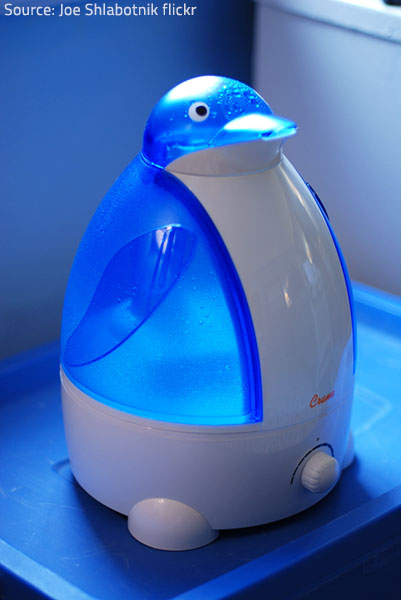
Choose the best dehumidifierA dehumidifier is a device that removes excess moisture from... More for your home according to your own specific needs and preferences.
A portable dehumidifierA dehumidifier is a device that removes excess moisture from... More offers a very convenient option as you can take it from one room to the other, depending on your specific needs at the moment. However, the humidityHumidity is the amount of moisture or water vapor present in... More level is different in different areas of your home, so a small dehumidifierA dehumidifier is a device that removes excess moisture from... More that works very efficiently in your living room may not be powerful enough to control the moisture levels in your kitchen or bathroom, for example.
You can choose from small capacity models for a single room, large capacity models for larger areas, and even whole-house dehumidifiers (which are particularly useful if you live in a very humid climate). So, research your options well and choose the one that will best suit your needs and requirements, as well as your available budget.
Just remember – home dehumidifiers offer the most advantageous solutionA solution is a homogeneous mixture of two or more substance... More for a healthier and more comfortable living environment.











